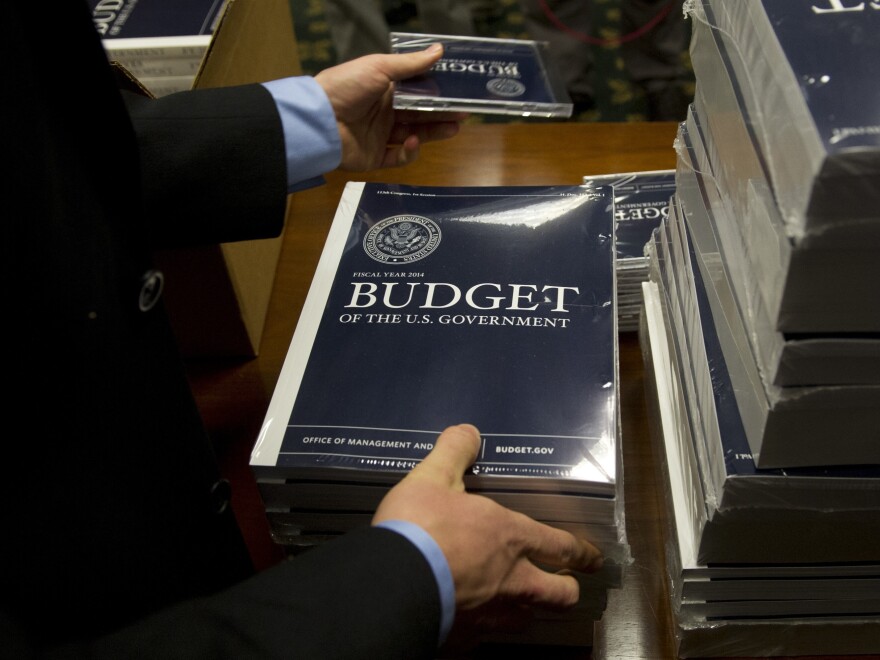UPDATE at 11:05 a.m. ET: Obama: Growing Economy, Shrinking Deficits Both Possible
President Obama unveiled his 2014 budget proposal Wednesday, calling it a "fiscally responsible blueprint" that can help grow the economy and shrink deficits.
The president said his plan addresses the debate about how to expand the economy while reducing government red ink: "This budget answers that argument because we can do both," he said at the Rose Garden.
"Nothing shrinks deficits faster than growth," Obama said. He added, "I hope that Republicans will come forward and demonstrate that they are as serious about deficits as they claim to be."
On revenues, the president said he would pay for a proposal to expand preschool programs by "raising taxes on tobacco products, which is the right thing to do for our young people."
House Speaker John Boehner fired back:
"The American people know you can't continue to spend money that you don't have," the Ohio Republican said in a statement. He continued:
"The federal government has spent more than what it has brought in in 55 of the last 60 years. Now think about this, you can't continue to go on like this. That's why we came forward with a plan that will balance the budget over the next 10 years. We believe strongly that it is time for Washington to deal with its spending problem."
Here's our earlier post:
President Obama will unveil his 2014 budget proposal on Wednesday, including cuts to Social Security and Medicare, as well as tax increases and new investments. The net, says the White House, will be $1.8 trillion in deficit reduction over the next decade.
The $3.77 trillion spending plan due out before noon on Wednesday includes $50 billion for roads, bridges and public works, $1 billion to spur manufacturing innovations and $1 billion for a revamp of higher education, Bloomberg reports.
But its aim to raise $580 billion in revenue partly by closing tax loopholes for the wealthiest Americans is likely to make the latest budget no more than an opening salvo in the seemingly unending fiscal grudge match with congressional Republicans.
The cuts to entitlement programs aren't winning much support among fellow Democrats, either.
As NPR's Scott Horsley explains on Morning Edition , there's something for everyone to dislike in the new budget — liberals don't like the spending cuts, and conservatives don't like the tax increases.
On taxes, he says, "it's far from clear that Republicans will go along with that. Certainly, Republican leaders [have] given no indication they will."
According to Bloomberg, a change in the way the Consumer Price Index is used to calculate cost-of-living adjustments on Social Security, veterans' pensions and tax brackets:
"... would bring smaller increases for Social Security recipients and bounce taxpayers into higher brackets more quickly. [Obama] also proposes to slow the growth in Medicare by cutting payments to drug companies and health-care providers and requiring higher income beneficiaries to pay more."
NPR's Frank James offers a detailed outline of the budget and says "even a budget that's going nowhere gives a president the chance to state priorities and place dollar amounts next to them."
The proposal's new spending includes a short-term "mini-stimulus" for road and bridge construction prompted by continuing high unemployment and a longer term call for high-quality preschool to be made more widely available.
That was already outlined in the president's State of the Union address. But as Scott says, "today we'll see the price tag. Not cheap. But the White House says it could pay for it with higher taxes on cigarettes."
The budget projects a deficit of $744 billion for the year. That would be the lowest gap between spending and revenue since 2008, according to The Associated Press.
Copyright 2020 NPR. To see more, visit https://www.npr.org. 9(MDAwMTM1NDgzMDEyMzg2MDcwMzJjODJiYQ004))


